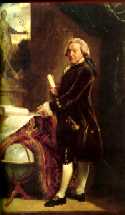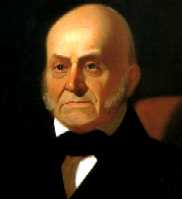

 |
|
 |
Abigail Smith was born in 1744 in Weymouth, Massachusetts, and like the majority of women during her time she received no formal education. She was taught and encouraged to read by her father, William Smith, a local minister. The education that she received at home in her fatherís library was extensive considering the common practice of the day, and Abigail proved to be an intelligent and insightful young woman. Her brother, William, studied Latin, because it was "the ticket of admission to college and the professions," and as such "was reserved for bright young males." Later in life, after watching her brother waste his own education and life, Abigail formed a negative opinion of the American education system, which concentrated wholly on the male sex. Her own education as a young girl, in the meantime, "prepared her for the one option available to women, the domestic role for which her mother was her noble model."
In her self-directed education, Abigail read authors such as Shakespeare and Milton who were popular at the time. She also read The Spectator, especially the essays of Joseph Addison. These works, which dealt with issues such as moral decency and political corruption in England, contained many references to the classics. Addison often began with a Latin quote, taken from Roman authors like Virgil, and he frequently alluded to events in Greek and Roman history to support his arguments. Through Addisonís works Abigail received some exposure to the classics, though it was through English translation. She truly loved more contemporary works, however. Abigailís brother-in-law, Richard Cranch, introduced her to modern poets such as Alexander Pope and James Thomson. She also enjoyed the prose work of Samuel Richardson, a novelist who dealt with issues such as marriage, family, and the education of women, which were of particular interest to Abigail. After her marriage to John Adams in 1764, Abigailís education increased in intensity. Through her husbands extensive library Abigail was introduced to history and politics, and she also became interested in the sciences. She continued to read about antiquity, though always in English translations. As time went on, Abigailís belief in better education for women grew strong. In 1776, she wrote to her husband, "I most sincerely wish that . . . our new constitution may be distinguished for Learning and Virtue. If we mean to have Heroes, Statesmen and Philosophers, we should have learned women." Abigailís education was very different from Johnís, but in no way did this diminish the sharpness of her intellect. She proved to be a perfect companion for John, able to communicate with him on an equal plane and offer advice and encouragement to him about the development of the young nation.
The fact that Abigail Adams knew ancient history is evident in references to antiquity throughout her personal letters. Though John stopped using the pseudonym "Lysander" after the couple married, Abigail replaced the name "Diana" with "Portia," "the virtuous Roman matron of history and the learned woman jurist in The Merchant of Venice." This was the name she used for the rest of her life in letters to friends and family. In a letter to John Quincy Adams dated December 26, 1783, Abigail alluded to ancient history, comparing the excessive pride of the Romans before the fall of the empire to that of the British before the American Revolution. In the same letter, she quotes Joseph Addisonís Cato, a popular play in the American colonies because of its portrayal of the ancient hero, Cato, and its themes of patriotism and democracy. Abigail wrote to her son,
It was the educational value of the classics that concerned Abigail, however, and led to her belief that classical education divided the sexes. In some of her letters to John, Abigail expresses hesitation upon the subject of formal, typically classical education. The couple frequently conversed about the education of their children, especially with Johnís lengthy absences from home and his desire to keep appraised of the childrenís progress. On July 17, 1782, Abigail wrote of the difficulties of sending her sons to board at school, since there were no grammar schools near the family home in Braintree, Massachusetts. "I must (could I find a School abroad to my mind) Board them at 18 Shillings pr week which is lowest . . . I could not live in the House were it so deserted. If they are gone only for a day, it is as silent as a Tomb," Abigail wrote. The tone of her letter suggests that not only is she concerned about cost and separation, but that she is not satisfied with the quality of the schools around them. A few months later, on November 11, 1783, Abigail wrote to John, "I have a thousand fears for my dear Boys as they rise into Life, the most critical period of which is I conceive, at the university; there infidelity abounds, both in example and precepts." She continued by citing examples from the curriculum that threaten to deviate her children from "the path of virtue." Though Abigail does not name any classical authors, this is an excellent example of her negative opinion of education, which she clearly held responsible for moral decay in societyís youth. For the most part, as already detailed in the description of John Quincyís education, the Adams children were taught at home by tutors. Abigail, unlike John, proved to be wary of public, formal education and she was less adamant than her husband in directing her childrenís studies.
Abigailís conclusive opinion on classical education was not recorded by her, but rather by her husband, in a letter to Benjamin Rush dated October 13, 1810. John Adams wrote, "Mrs. Adams says she is willing you should discredit Greek and Latin because it will destroy the foundation of all the pretensions of the gentlemen to superiority over the ladies and restore liberty, equality, and fraternity between the sexes." This strong opinion places Abigail opposite her husband, a lover of the classics. Because classical education was denied to women, something which Abigail witnessed firsthand in the education of her brother as a young girl, she saw it as a barrier to equality between the sexes. It is interesting that Abigail singled out the classics, considering that education in any form was usually reserved for men. Classical education was simply the typical form of education at the time, and Abigail and Rush attacked antiquity seemingly because it was so intrinsically tied with education in general. Abigailís viewpoint echoed a growing sentiment at the time, one that was not limited to women. There was a movement to eliminate classics from the curriculum of schools because "classics were already coming to be regarded as a decorative accomplishment for men." Rush obviously supported the movement, because he saw the classics "as remnants of aristocratic education unsuited to a republican nation and an industrial economy." Classical education had become such a hallmark of the aristocracy that, in the eyes of women and the lower classes especially, the subject lost its intellectual value.
Many women, aside from Abigail Adams, felt the gap between the sexes growing larger and blamed classical education. Writer Susannah Rowson, for example, wrote in 1794:
There is no question that educational opportunities for women in the late eighteenth and early nineteenth centuries were far from equal to those available to men. In 1798, Benjamin Rush wrote, "One cause of the misery of many families, as well as communities, may be sought for in the mediocrity of knowledge of the women. They should know more . . . in order to be happy themselves, and to communicate happiness to others." This statement foreshadowed the changes that were to come in the American educational system, positive changes that would bring women to a level of equality with men. These changes would also bring the downfall of the classics in American schools, however. Whether or not the classics were to blame for the discrepancy in learning between men and women is a matter of debate. The reason that Abigail Adams was against classical education, while her husband was in favor of it, can be seen in their different experiences with the classics, stemming back to their different educations. Abigail could not escape the classical heritage of her day, however, as we see especially in her letters. Abigail Adams provides a different perspective on the classics than those of her husband and eldest son, and perhaps she also provides further reasons for the decline in popularity and usage of the classics as the nineteenth century progressed.